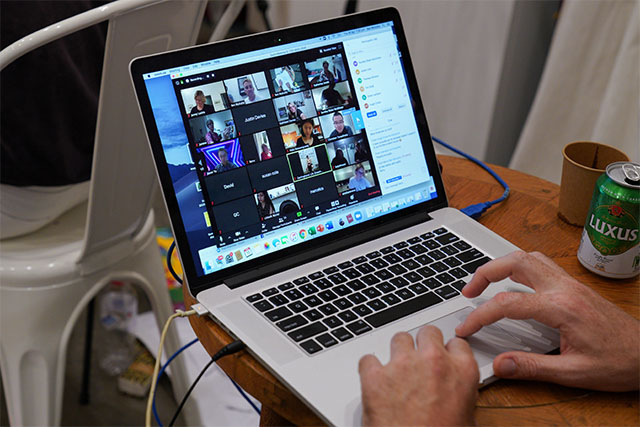Business advocacy group Go Negosyo is the latest group to be targeted by “Zoom-bombers” or hackers in an online forum held in the popular video conferencing platform on Thursday.
CNN Philippines earlier reported that the group’s meeting on the novel coronavirus pandemic with chief executive officers and corporate owners were targeted by “unidentified trolls” who showed “lewd photos of an anime pornography scene.”
The hackers suddenly shared the unwarranted photos in the middle of the discussion, CNN reporter Rex Remitio said on his Facebook page.
The incident was dismissed by Go Negosyo founder and Presidential Adviser for Entrepreneurship Joey Concepcion, who said that the “zoom-bombing” was perpetrated by “some people not having much to do in life.”
“But this [online seminar] was well attended and [the] key to opening up the economy more is to conduct massive testing using both antibody rapid and RT-PCR-based testing,” he told CNN Philippines.
Pictures of the “Zoom-bombing” incident were shared with the news outlet through Discord.
Go Negosyo held the online forum on Thursday morning through Zoom for “Project Ark,” an initiative by companies to hold mass testing of COVID-19 at barangay levels.
The group previously shared the link of their meeting on Facebook, as well as the password for the virtual discussion.
Last Friday, hackers of the video conferencing platform similarly infiltrated a virtual seminar of the Center for Women’s Resources (CWR) and Gabriela National Alliance of Women.
Reports said that the women’s rights groups were holding a conference about violence against women when unidentified trolls played vulgar sounds and drew lewd images on the screen.
CWR executive director Jojo Guan condemned the online attacks and lamented how internet-based platforms are being “weaponized” as the global community deals with a health crisis.
People have been resorting to video conferencing platforms and messaging apps to hold discussions as the enhanced community quarantine takes place in a bid to “flatten the curve” or slow down the transmission of the novel coronavirus.
Protocols dictate that people are supposed to observe home quarantine and to avoid going out as much as possible. Non-essential onsite work and classes have also been held off to reduce movement.
Serious security issues
Zoom is one of the most popular video conferencing platforms used to communicate amid quarantine period. It is widely preferred since users can access features like beautification filters and virtual backgrounds for free.
Business Insider said that it is also preferred for its “functionality,” where people have claimed that it has a “consistently” better quality in terms of video calls than other teleconferencing applications.
Other users claim that Zoom’s video streaming quality is better than Google Hangouts, another teleconferencing platform. They also noted that Zoom has the ability to record video meetings, which they find convenient.
Despite the features and reported functionality, the platform has been under fire for a number of security and privacy issues.
READ: Zoom sued for overstating, not disclosing privacy, security flaws
What is zoombombing?
One of the most pressing concerns is the issue of “Zoombombing” or the phenomenon where uninvited attendees break into and disrupt an ongoing meeting with hate-filled or pornographic content.
Officials around the world such as the Indiana Election Commission, candidates for a town sheriff post and an American senate committee for agriculture have also experienced being “Zoombombed”
The video conferencing platform is planning to roll out a new update that will be available by the end of the week. Its version will reportedly address a number of security issues and include the ability to report users.
Suggested alternatives to the platform include Skype, Microsoft Teams, HouseParty, Signal, WhatsApp, Google Meet, Jitsi Meet and Talky, among others.
RELATED: Explainer: Zoom bombs make choosing video apps harder for lockdown chats

